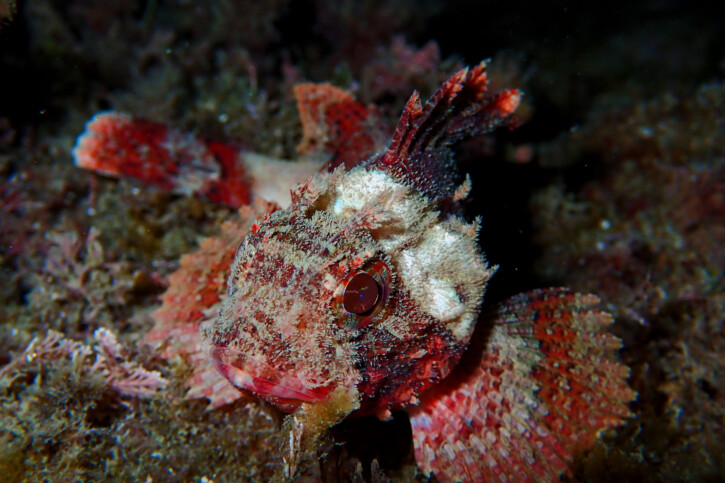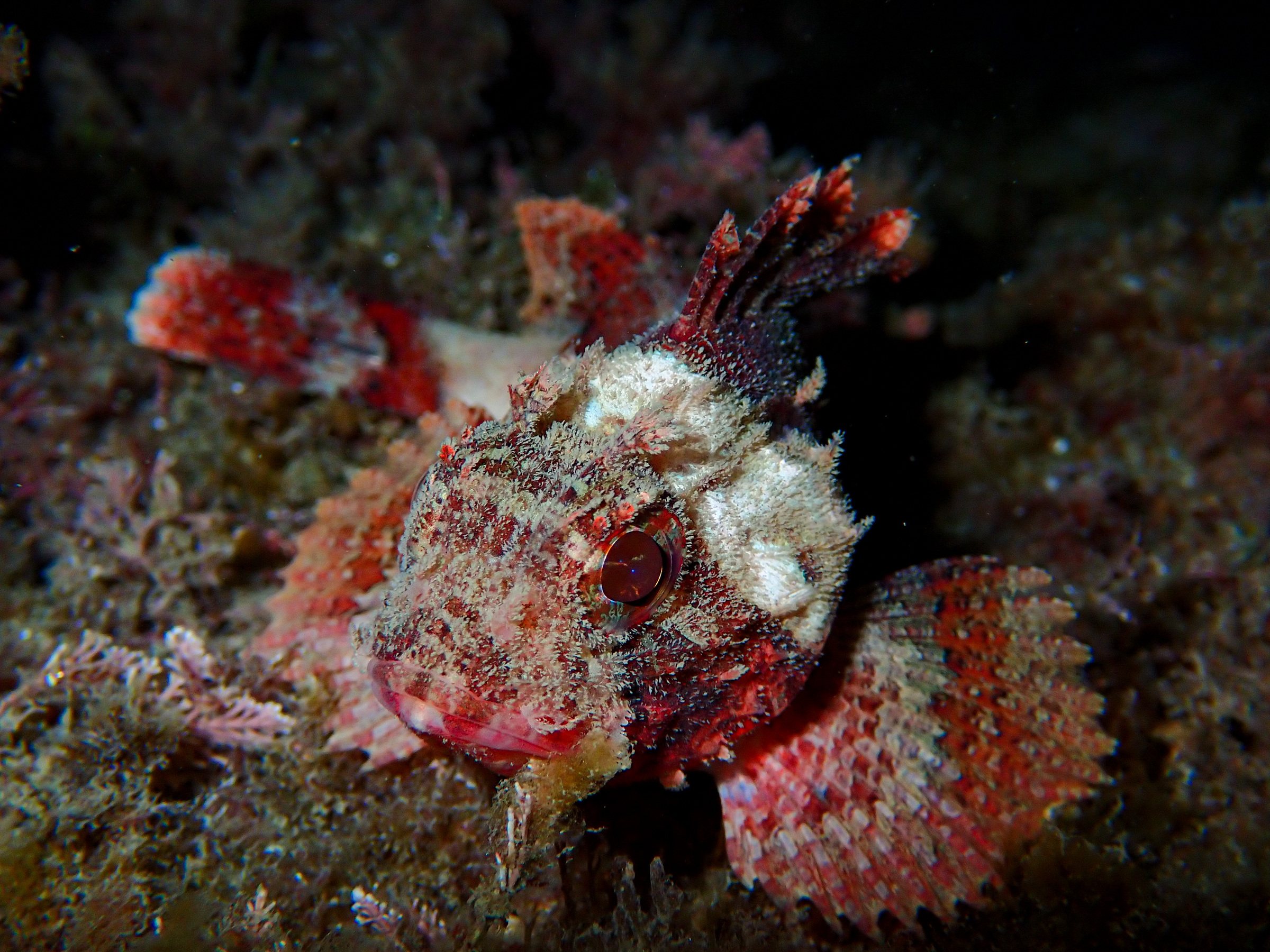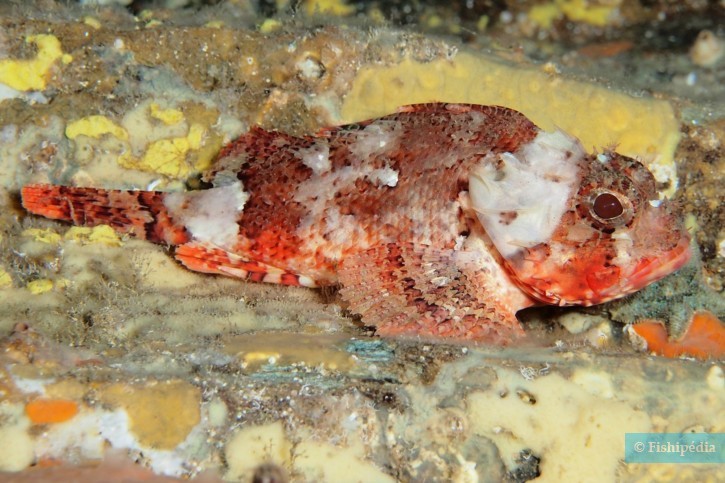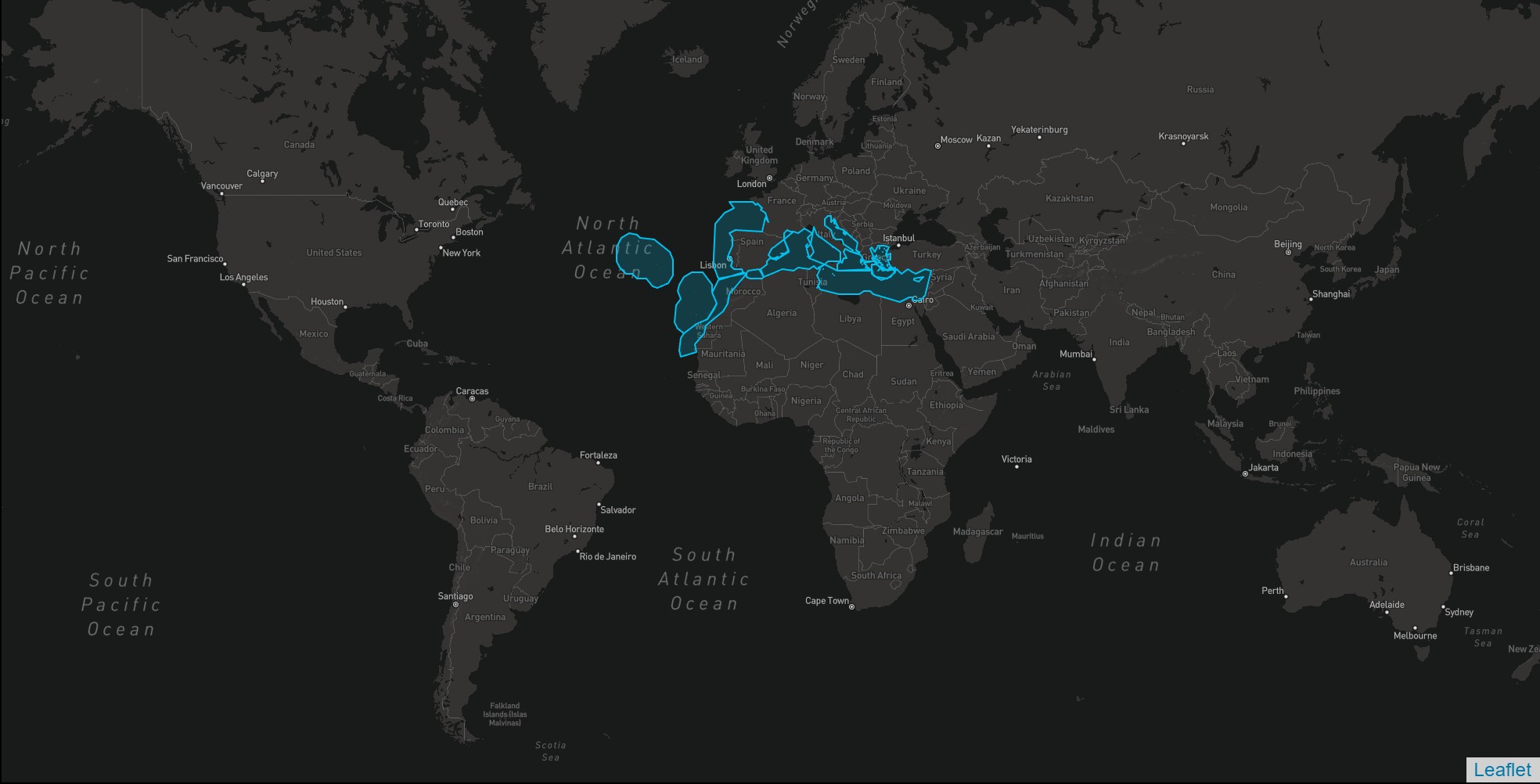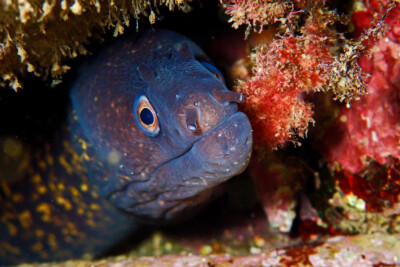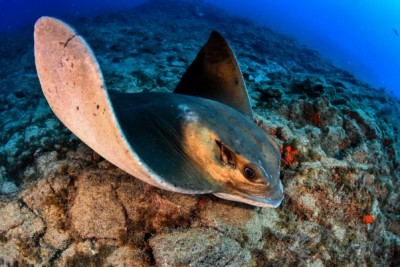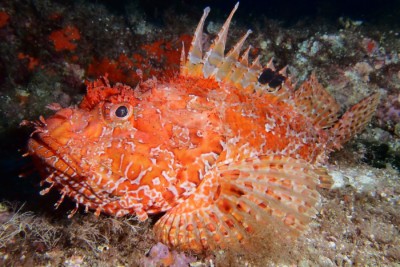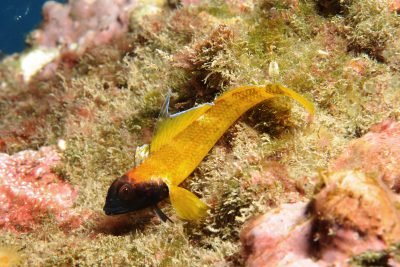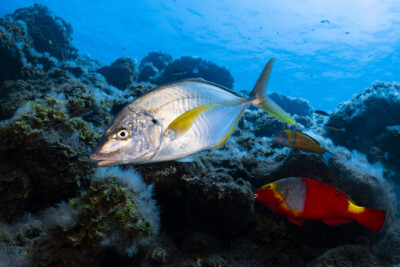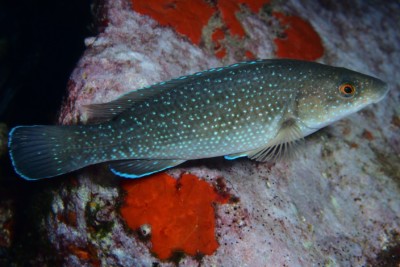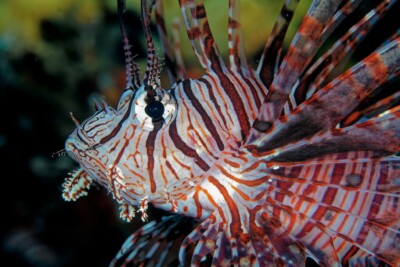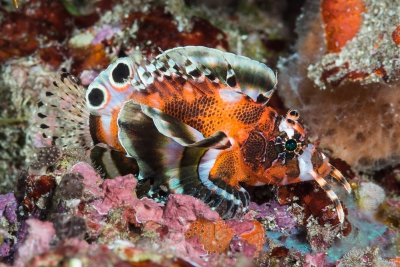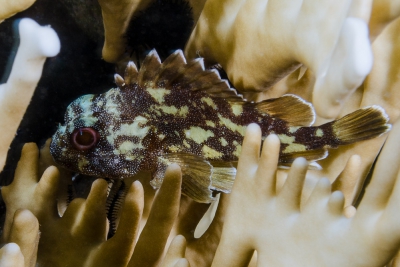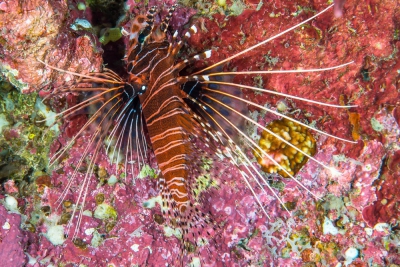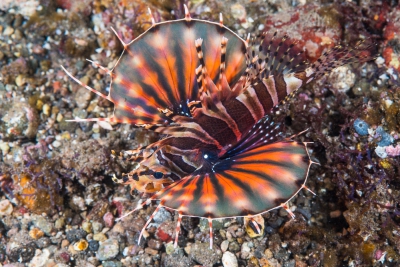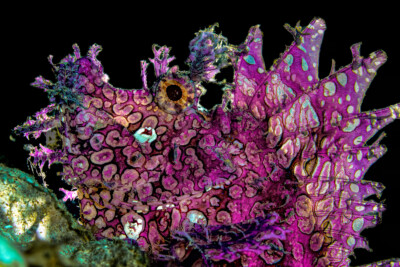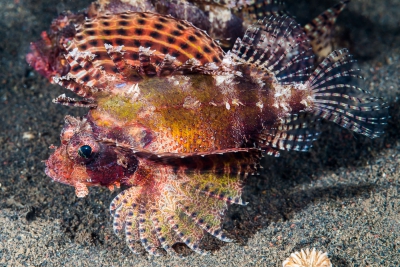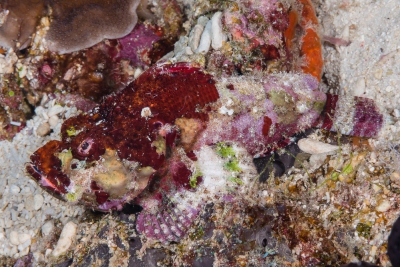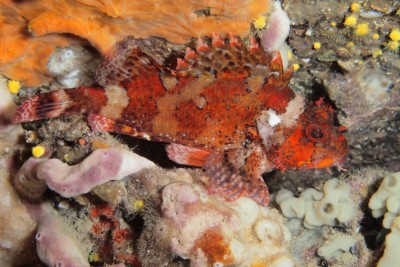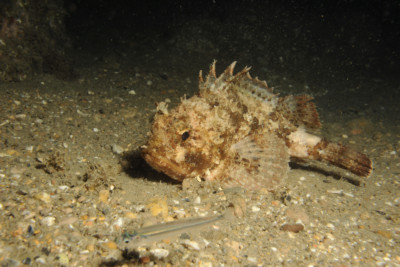Introduction
The red scorpionfish is found from the Canary Islands to the Black Sea. It is present in Madeira, the Azores, and along the Senegalese coast. In the Black Sea, there is an endemic subspecies: Scorpaena notata afimbria.
Like its larger cousin the red scorpionfish, this small predator uses its camouflage to surprise its prey. Discreet, this species resides motionless in rocky bottoms and seagrass beds. It also frequents deeper muddy and sandy areas (up to 700 meters).
Although less subject to fishing pressure, populations of this species are decreasing, particularly due to its capture as bycatch by trawlers. Locally, it is subject to strong pressures, especially on the French coasts where it is sought after for bouillabaisse recipes.
The red scorpionfish is venomous and can cause accidents. However, apart from allergies, these stings are rarely serious.
The growth of this species is slow and populations may have difficulty in recovering.
Who is it?
Morphology
-
Type
-
Average size12 cm
-
Maximum size23 cm
-
Longevity8 year
-
ShapeOvoid
-
Mimicrystone
-
Patternmottling
-
Type
-
Average size12 cm
-
Maximum size23 cm
-
Longevity8 year
-
ShapeOvoid
-
Mimicrystone
-
Patternmottling
How to recognize This fish ?
The body and fins closely resemble those of the red scorpionfish (S. scrofa), making juveniles very difficult to discern. However, unlike the latter, the red scorpionfish does not have skin flaps under the jaw. It also differs from S. maderensis by the absence of a black band on the caudal fin. Finally, S. porcus has large flaps above the eyes and is generally darker.
As its name suggests, this species is red to reddish. It has dark marbling and spots all over the body. These markings vary depending on the habitat.
Like its cousins, the head is wide and large, covered with small spines, and its protractile mouth allows it to quickly catch its prey.
Sexual dimorphism
Like other scorpionfish, females may be larger in size.
Behaviour & Life cycle
-
dietcarnivorous
-
Sociabilitysolitary
-
territorialNo
-
Way of livingdiurnal
The red scorpionfish is a solitary fish that spends its days lying in wait on the seafloor. It mainly feeds on crustaceans and small fish. It is sedentary and not very shy.
Its growth is slow and its longevity significant. A study conducted in the Adriatic Sea showed that this red scorpionfish, barely 20 centimeters long, can live over 16 years.
It is a particularly important species in the balance of Mediterranean ecosystems. It is among the first colonizers of artificial reefs and is found under offshore gas platforms.
Reproduction
-
Reproductionovipare qui pond sur substrat caché
According to studies and regions in the Mediterranean, this species reproduces either from May to August or from July to October. Several spawnings can occur, each containing between 6,000 and 33,000 eggs with a diameter of 500 µm.
Few studies have been published on the age and size of sexual maturity. It appears that sexual maturity is reached around 14 centimeters.
Risks for humans
-
VenomousYes
Like the red scorpionfish, this venomous species can cause accidents upon touch. The risk is limited for divers, but encountering a red scorpionfish in shallow areas, mainly in rocky zones and seagrass beds, is possible.
However, caution is advised when snorkeling or diving, and one should remain attentive when observing scorpionfish, regardless of the species. Most accidents occur among fishermen who, while handling the species, may exert pressure on the spines and thus be stung by the venom. To avoid this inconvenience, it is advisable not to handle this species without protection.
The sting is usually not serious but can be dangerous for allergic or cardiac individuals.
What to do in the event of a sting?
in case of sting, the following rules should be followed, in this order:
- Isolate the victim from the danger and quickly remove him or her from the water
- Call for help
- Lay the victim down in a half-sitting position and avoid any effort
- Immobilize the affected limb
- Clean the wound
- The venom of this species being thermolabile, it can be neutralized if it is submitted to a temperature of about 45 °C. It is therefore possible to heat the wound. This popular technique should be practiced with great care so as not to aggravate the wound by burning it. It is advisable to immerse the affected limb in hot water.
- If the puncture is too deep, heating the wound will be less effective.
Sometimes the sting can cause discomfort or even loss of consciousness in the victim. The stings are usually very painful.
Origin and distribution
What is its habitat?
Natural environment characteristics
-
Depth10 - 700 m
Biotope presentation
This scorpionfish frequents various habitats. It is found in rocky, mixed, muddy areas, and in rugged bottoms (debris, rubble...).
Species of the same biotope
To go further
Sources & Contributions
Participation & Validation
The Fishipedia team and specialist contributors are committed to providing high-quality content. However, although the information comes from scientific sources or testimonials from specialists, the cards may contain inaccuracies.

Benoit Chartrer

Julie Magnus
Translation
Translation done with the valuable contribution of our translators, who make this information available to a wider audience. We sincerely thank them for their commitment.
Bibliographic references
- - GBIF
- - age and growth of small red scorpionfish, scorpaena notata(actinopterygii: scorpaeniformes: scorpaenidae), a common discardspecies from the portuguese fishery - Ana NEVES - Vera SEQUEIRA - Ana R. VIEIRA - Rafaela B. PAIVA - Leonel S. GORDO - Acta Ichthyologica Et Piscatoria - 2015.
- - Annual reproductive cycle and fecundity of Scorpaena notata - Marta Munos - Maria Sabat - Silvia Vila - Margarida Casadevall - Scientia Marina - 2005.
Scientific partners
Tags
Species of the same family
Same genus
Species of the same biotope
